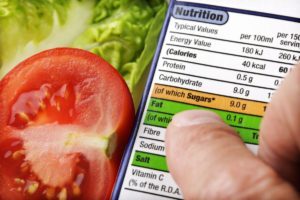Sugar is everywhere and it can be hard to avoid. But if you know what to look out for, it becomes much easier.
Are you concerned about your sugar intake? If yes, you’re not alone. In fact, the average American consumes approximately 77 grams of sugar daily. That’s more than three times the daily recommended amount of sugar for women. Unfortunately, the numbers are much worse for children (American Heart Association, 2022). While sugar is a necessary part of our diets, too much can lead to health problems such as obesity, tooth decay and diabetes. As such, you need to be intentional to decrease your sugar intake.
BTW, did you know that more than 75% of Americans are desirous of decreasing their sugar intake to potentially decrease their risk of heart disease and diabetes?
If you’re one of them and are looking for tips to decrease your sugar intake, read on.
I’ve got some advice that will help you cut back on your sugar intake without feeling like you’re missing out.
- Sugar is everywhere and it can be hard to avoid. But if you know what to look out for, it becomes much easier.
- The disadvantages of too much sugar
- What's the sugar recommendations?
- Simple tips to decrease your sugar intake
- What is glycemic index?
- 1. Decrease sugar intake in tea/coffee
- 2. Cut back on the flavored yogurt to cut down on sugar
- 3. Drink wine instead of cocktails to decrease your sugar intake
- 4. Read labels to decrease your sugar intake
- 5. Shop for alternatives to decrease your sugar intake
- 6. Make your treats small and satisfying
- 7. Make your desserts tasty and healthy to cut down on sugars
- 8. Eat less processed foods to decrease your sugar intake
- Why is it so hard to decrease sugar intake?
- Is sugar addictive?
- What foods should I eat less of to decrease my intake of sugar?
- Final words on decreasing your sugar intake
- What are some expert tips on healthy eating?
- Why is sugar so bad for us?
The disadvantages of too much sugar
Sugar can also cause your energy levels to spike and then drop dramatically, which makes it difficult for you to focus on anything.
Unfortunately, the more sugar in your diet, the higher is your risk of developing type 2 diabetes.
Actually, this increased risk is mostly due to the effects of excessive sugar intake on your liver and because it increases your likelihood of developing obesity.
Type 2 diabetes causes insulin resistance and makes it harder for your body to regulate blood glucose levels. If left untreated, this disease can lead to blindness or even limb amputation due to poor circulation in the extremities.
In addition, high-sugar diets have been shown to increase inflammation throughout the body that may contribute to heart disease and cancer development.
You don’t need me telling you how terrible all these things sound! I get it – no one wants any of those conditions hanging over their head like an ominous cloud-ready at any moment to burst with lightning strikes of pain and suffering (okay maybe I’m being dramatic).
But here’s some good news – reducing sugar intake doesn’t mean depriving yourself either.
There are plenty of delicious foods out there that taste just as sweet without all the added sugars so go ahead and indulge guilt-free.

"Study after study also directly links the intake of excess sugar to an increased risk for cancer, diabetes, gastrointestinal problems, eye diseases, osteoporosis, coronary heart disease, and other inflammatory diseases." - Colette Heimowitz
What’s the sugar recommendations?
According to the American Heart Association, here’s what’s recommended:
(1) Men: less than 9 teaspoons daily
(2) Women: less than 6 teaspoons daily
Just remember, 4 grams of sugar = 1 teaspoon
Notably, a 12 ounce can of soda contains about 8 teaspoons of sugar. So, there goes your daily limit.
"Sugar releases the same opioid and endorphins that love does. That's why breaking up with sugar can be so difficult." - The sugar film
Simple tips to decrease your sugar intake
Here are some simple tips to decrease your sugar intake without depriving yourself:
- Decrease sugar in tea/coffee
- Cut back on flavored yogurt
- Opt for wine instead of cocktails
- Read food labels
- Choose healthy alternatives
- Make your treats worth it
- Choose tasty, healthy desserts
- Eat less processed foods
Before I dive into these tips to decrease your sugar intake, it’s important to understand when glycemic index is.
What is glycemic index?
Glycemic index is a measure that indicates how quickly the sugar from a food enters the blood stream.
Foods with a high glycemic index cause an increased blood sugar level, which can lead to health problems such as diabetes and obesity.
Foods with a low glycemic index cause only a small increase in blood sugar level.
Actually, foods that are rich in protein, fiber and fat usually have a low glycemic index.
This means that they are absorbed more slowly into the body, which is particularly healthy for people who suffer from diabetes or obesity because it prevents them from having sudden spikes of blood sugar levels.
However, there has been some controversy the importance of glycemic index in the past few years.
This is because individual responses to food differs, particularly when one food is combined with another in a single meal.
Regardless, acknowledging the glycemic index does not mean you should ignore the amount of total sugars contained in the food.
| Glycemic Index | |
|---|---|
| High Glycemic Index | 70 or More |
| Medium Glycemic Index | 56 – 69 |
| Low Glycemic Index | 55 or Less |
| Food | Glycemic Index |
|---|---|
| Table Sugar | 64 |
| Dried Dates | 62 |
| Pure Honey | 58 |
| Maple Syrup | 54 |
| Banana / Mango | 51 |
| Apple | 39 |
| Orange / Plum | 40 |
| Pears | 38 |
| Cherries | 20 |
1. Decrease sugar intake in tea/coffee
Start drinking your tea and/or coffee black without sugar. If you can’t completely cut out sugar, make a deliberate effort to increasingly reduce the amount of sugar you consume in your beverages.
This is a particularly great option if you find it hard to cut down on sugar in your foods and snacks.
At least you’re cutting down in sugars from one source and aren’t both eating and drinking to surpass your limits.
2. Cut back on the flavored yogurt to cut down on sugar
I know you love that vanilla flavor but it’s got 26 grams of sugar which is nearly 6 teaspoons per serving!
Unfortunately, some brands may contain even more.
Please note, I’m not saying to stop yogurt. Yogurt has tons of health benefits particularly for your digestive health and immunity. But, don’t be deceived by these manufacturers.
They don’t have your best interest at heart – well at least most of them don’t.
Essentially, if a food is healthy, it doesn’t mean that all variations of it is.
Pay attention to preservatives and additives. And, this advice doesn’t only apply to yogurt.
3. Drink wine instead of cocktails to decrease your sugar intake
Notably, cocktails tend to have more added sugar than wines, beer and liquors.
But, this is no excuse to drink tons of beer and alcohol. Remember, there are guidelines for these as well.
Check them out here: List of 5 Most Unhealthy Habits to Quit ASAP.
4. Read labels to decrease your sugar intake
Another easy way to cut out unnecessary sugars is to always read the nutrition label before you buy any product.
If it’s got too many carbs or grams of sugar per serving, put it back on the shelf.
Some sugary foods may be disguised as healthy or have healthy labels on them, but that doesn’t mean they aren’t loaded with sugar.
Take granola bars for example – some of these are more than 50% sugar so be sure to read through all the ingredients before you buy anything.
In fact, companies are now mandated to disclosure the amount to sugar a product contains.
Reading the nutrition label is an easy way to determine how much sugar is in a product.
Speaking of which, I was astonished at how much sugar some items contain. The relationship between me and my favorite snacks have not been the same.
5. Shop for alternatives to decrease your sugar intake
Don’t be afraid to shop around for healthier alternatives for some of your favorite foods. Your taste buds might need to adjust, but so will your waistline.
However, be warned, most sugar alternatives aren’t actually much better than sugar itself.
But, plant based sweeteners like stevia and monk fruit have been recognized as safe (American Heart Association, 2022).
However, due to inconclusive evidence and controversy, caution should be taken when using these products in diabetics, pregnant and lactating women, children, persons who suffer from epilepsy and migraines (Sharma et al., 2016).
Here are some healthy sugar alternatives for you:
- Replace sugar with raw honey which doesn’t raise blood sugar levels as quickly. Additionally, since honey is sweeter than sugar, you will likely need less of it. Honey also has some minerals and vitamins. Notably, due to potential allergies and the risk of botulism, honey is not recommended in young children, particularly those below the age of 1 year.
- Use whole fruit in place of sugar to sweeten recipes.
- Replace 2-4 tablespoons of sugar in a recipe with maple syrup. Maple sugar is also sweeter and has a lower glycemic index than sugar. But, moderation is fundamental.
- Substitute soda with coconut water, flavored sparkling water or low-fat milk.
- Add spices like cinnamon, nutmeg, ginger, cardamom, cloves to coffee and tea to naturally sweeten it.
- You can’t go wrong with drinking water instead of juice and soda.
- Substitute sugar with stevia or monk fruit which are FDA approved as nonnutritive sweeteners. These alternatives also have fewer calories and more intense sweetness than sugar.
6. Make your treats small and satisfying
Finally, if you’re going to have a treat – make it count! Don’t reach for sugary snacks that aren’t satisfying, don’t taste good and leave you craving for more.
Instead, opt for something tasty so you feel satisfied the whole time while eating it and aren’t tempted to go back for seconds (or thirds, fourths, and fifths).
7. Make your desserts tasty and healthy to cut down on sugars
Desserts can still taste delicious without any added sugars. If you must have something sweet after dinner, make it dark chocolate or your fresh fruit.
Fruit is a great substitute for any dessert craving you may experience. Fruits are refreshing, sweet and packed with vitamins.
Whatever you choose, just read the packaging to ensure that there is no added sugar in it.
8. Eat less processed foods to decrease your sugar intake
Ever heard of high fructose corn syrup? Well, this is a sweetener that’s often found in sodas, drinks and processed foods that’s even sweeter and cheaper than sugar.
Here’s what I recommend to decrease your consumption of processed foods:
- Use fresh fruit instead of canned fruit for desserts.
- Eat more vegetables and less processed food to reduce the amount of added sugars in your diet.
- Fruit juice often contains lots of added sugar. So, try to limit juice consumption to 5 ounces daily. Also note, fruit juice does have it’s health benefits. In fact, a small amount on a regular basis has been linked to improved heart health. But, too much fruit juice means too much sugar which is always bad for your health.
Here’re some reasons to choose whole fruit over fruit juice:
- Whole fruit makes you feel full for a longer period of time.
- Fruit juice is lower in dietary fiber which helps your digestive health.
- The sugar from fruit accumulates in your body in at a lower and slower rate when compared to fruit juice. This helps to prevent those unwanted sugar spikes.
Read also: Expert tips for a healthy breakfast.

"Carbohydrates, and especially refined ones like sugar, make you produce lots of extra insulin. I've been keeping my intake really low ever since I discovered this. I've cut out all starch such as potatoes, noodles, rice, bread and pasta." - Cynthia Kenyon
Why is it so hard to decrease sugar intake?
Some research shows that we’re biologically hardwired to like sweets and crave sugary foods.
Moreover, it is so hard to decrease the use of sugar due to the lack of culture surrounding sugar intake.
Sugar is also a quick fix for energy. It creates a feeling of high after eating it.
So, it can be difficult to look beyond short-term fixes and think about the long-term consequences of eating high amounts of sugar on our bodies.
At the very least, make an effort every day.
The sugar industry has been around for over 100 years and they’re not going to go down without a fight.
In fact, food companies use sugar to make food more appealing.
Unfortunately, there are many hidden sugars in foods that people don’t realize they’re consuming.
Is sugar addictive?
Scientists used MRI scans to observe the brain activity of participants after they consumed sugar.
Participants responded with pleasure and rewards, similarly in these scans as they did to a hit of cocaine or morphine.
Additionally, animal studies have shown similar withdrawal symptoms with the use of sugars.
These withdrawal symptoms occur due to dopamine deficiency in the brain and can even cause symptoms similar to attention deficit hyperactivity disorder (ADHD) and depression (New Hall Hospital, 2017).
Unlike salt, sugar does not have an ‘aversion signal.’ That means you can eat lots of it and still want more.
This isn’t to say that all people who eat sugar are addicted, but it is an interesting look into how your body responds to certain foods and what it’s like to be addicted to something.
"Healthy isn't a goal. Its a way of living." - Alison Zemanek
What foods should I eat less of to decrease my intake of sugar?
Beverages, followed by snacks and sweets are the leading category for added sugars, with soft drinks containing a whooping 25% added sugars (American Heart Association, 2022).
Besides obvious foods like soda, candy, cookies, and other desserts, here are a few surprising sources of hidden sugars:
- Ketchup
- Bread or bread products
- Condiments or salad dressing
- Canned soups and vegetables
- BBQ sauce
- Breakfast sandwiches
- Pancake syrup
Read also: List of the best foods to eat for a healthy diet
Even if you have a sweet tooth, cutting back on your intake of added sugars is not impossible.
Start by keeping track of what you put into your body through reading food labels and cooking at home etc.
Final words on decreasing your sugar intake
With the help of these tips, you should be able to lower your sugar intake and live a healthier life.
What do you think? Have any additional thoughts or questions about how we can decrease our sugar intake?
I’d love to hear from you in the comments below.
Read also: Daily routine to maintain wellness and stay healthy in 2022

"I've been more conscious of my salt intake, sugar intake, making sure I'm not eating as many processed foods." - Monica Denise Brown
Related topics
What are some expert tips on healthy eating?
Are you looking to improve your eating habits but not sure where to start? Check out these expert tips on healthy eating.
From making simple swaps to planning, these tips will help make healthy eating easy.
So what are you waiting for? Start incorporating these tips into your daily routine today. Read more
Why is sugar so bad for us?
For years, we’ve heard that sugar is bad for us. But what makes it so harmful?
And why are some forms of sugar worse than others?
In this blog post, I’ll answer those questions and explore how sugar can harm our health.
I’ll also discuss strategies for reducing your intake of added sugars. So let’s get started.
References
American Heart Association (2022) How much sugar is too much?
Diabetes Care Community (2011-2022) 10 low glycemic fruits for diabetes
New Hall Hospital (2017) Is sugar more addictive than cocaine?
Sharma, A., Amarnath, S., Thulasimani, M., & Ramaswamy, S. (2016). Artificial sweeteners as a sugar substitute: Are they really safe?. Indian journal of pharmacology, 48(3), 237–240.
Rushana Greenidge-Horace










Leave a Reply